October 2019
This quarterly newsletter has been created by Wayne RESA literacy consultants for literacy educators. In each issue, you will find Literacy Learning Network updates and information, statewide initiative updates, book synopses, teaching and coaching strategies, and upcoming professional learning opportunities. We look forward to partnering with you as we engage in best practices in literacy instruction for all students.
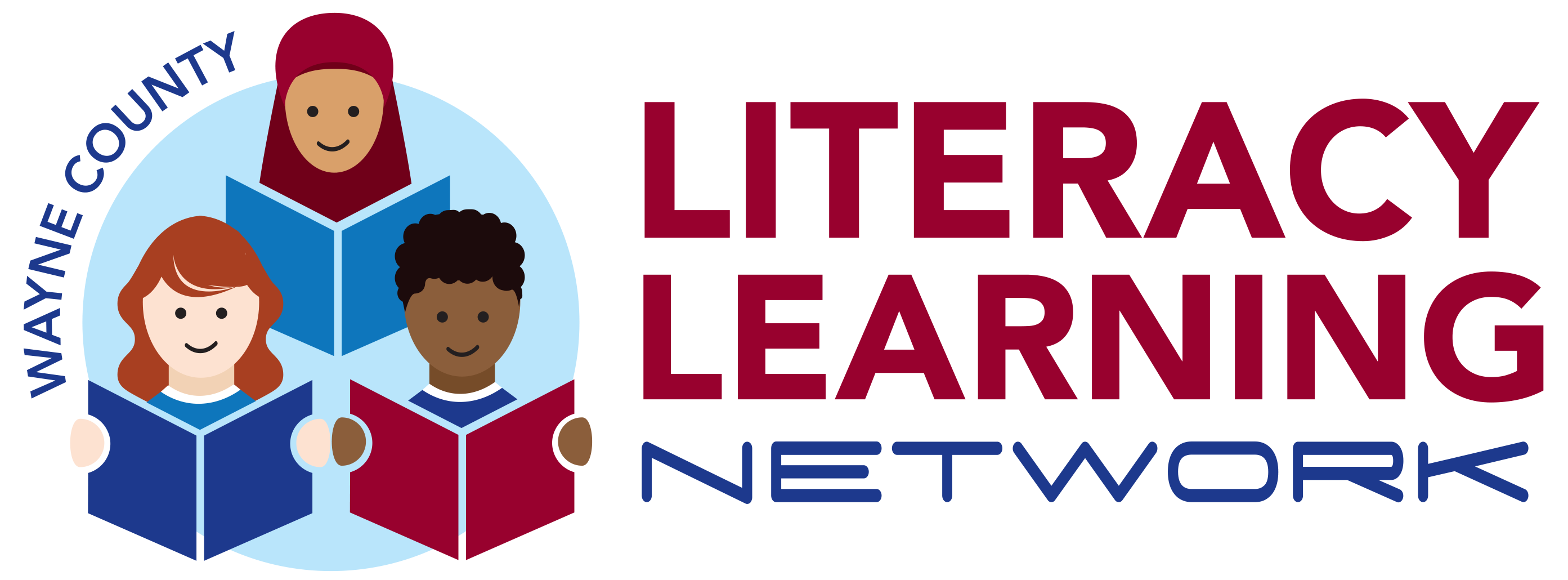
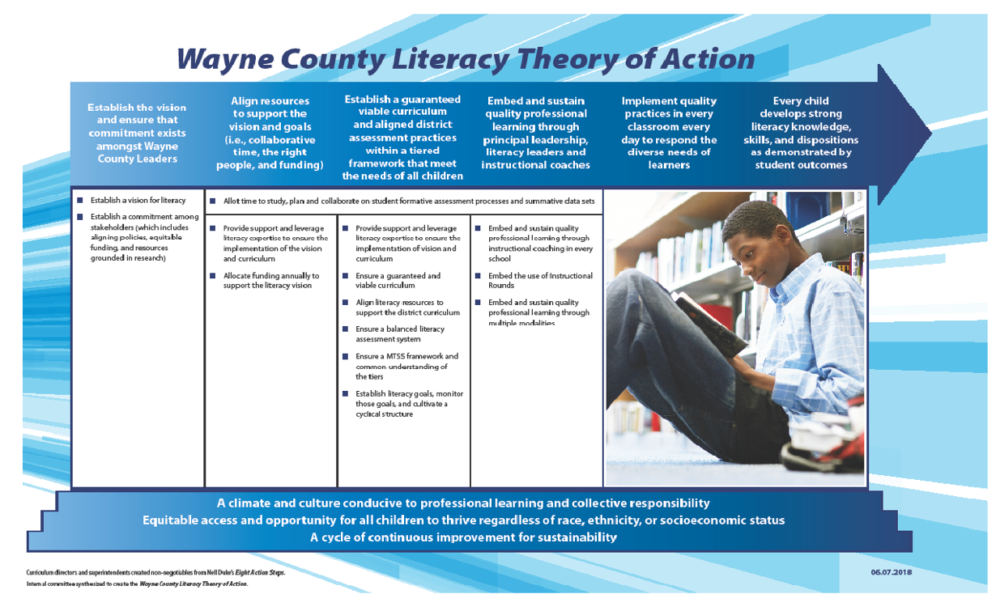
The Wayne County Literacy Learning Network continues to work towards our goal of ensuring equitable literacy access and opportunity for ALL. One of the main purposes of the WC Literacy Learning Network is to provide adaptable resources for use in schools/districts. One such resource is an editable presentation designed to explain the current focus on literacy within our state and help families understand why literacy is such an urgent need. Schools are welcome to use the whole presentation or choose the slides that best fit their needs.
Statewide Updates
Through a Michigan Department of Education (MDE) Grant to the Sault Area Public Schools, Learning.com has received $500,000 to conduct a pilot project for the assessment of digital literacy. The pilot program promises to help prepare Michigan students in developing critical technology skills that provide the foundation for college and career readiness in the 21stcentury. Schools serving K-8 students throughout the State of Michigan can now register to participate at no cost. Schools interested in participating in the pilot program should visit: https://info.learning.com/michigan-digital-literacy-funding.
In its ongoing effort to raise Michigan students’ literacy skills, MAISA GELN has revised the state’s Literacy Theory of Action which guides systemic support of student learning. This document can be used to introduce the Essential Instructional Practices in Literacy documents that span learning levels from birth to 12th grade and include school-wide and coaching instructional practices as well.
The School-wide and Center-Wide Screening Tool is designed to help schools determine where to start when implementing the Essential School-wide and Center-Wide Practices in Literacy. It is important to note that this document is to be used as a screener, and the results should be used to inform conversations about where to focus the next phase of work in improving building-wide literacy practices.
The SAT Task Force is updating the SAT Curated Resources and will soon provide a document that links the Essential Practices for Disciplinary Literacy Instruction in the Secondary Classroom to the SAT.
Books and Strategies
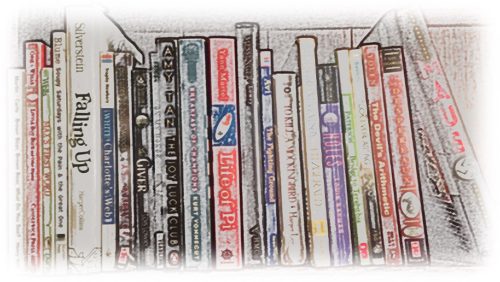
Book Talk
Igniting a Passion for Science in Readers of All Ages
If Sharks Disappeared
Lily Williams
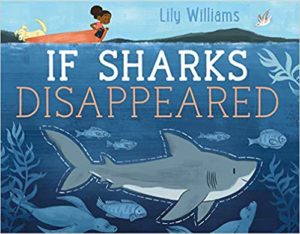 Lily Williams’ informational picture book, recommended by the Orbis Pictus committee, uses context-rich vocabulary to help readers understand the complexity of ecosystems, the role of apex predators, and the need for balance within food chains. The young narrator explains how the extinction of sharks will impact plants, fish, and other ocean dwellers, and eventually, the land and humans will suffer from this imbalance as well. Because overfishing has already jeopardized more than one-fourth of all shark species, the narrator closes by encouraging her readers to take action.
Lily Williams’ informational picture book, recommended by the Orbis Pictus committee, uses context-rich vocabulary to help readers understand the complexity of ecosystems, the role of apex predators, and the need for balance within food chains. The young narrator explains how the extinction of sharks will impact plants, fish, and other ocean dwellers, and eventually, the land and humans will suffer from this imbalance as well. Because overfishing has already jeopardized more than one-fourth of all shark species, the narrator closes by encouraging her readers to take action.
The Boy Who Harnessed the Wind
William Kamkwamba and Bryan Mealer
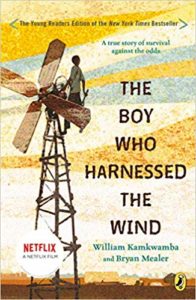 In this poignant memoir, William Kamkwamba recounts his young life in Malawi. His deep desire to learn, particularly about science, is thwarted by his family’s financial issues and a wide-reaching famine, preventing William’s attendance at school. Despite these setbacks, he perseveres by reading books from the local library. By picking a part the scientific concepts that support his wonderings, William eventually creates a windmill that powers his entire home. His journey afterward is remarkable, taking him all over the world; yet, feeling strongly about the empowerment of knowledge, he returns home to advocate for the educational opportunities of others.
In this poignant memoir, William Kamkwamba recounts his young life in Malawi. His deep desire to learn, particularly about science, is thwarted by his family’s financial issues and a wide-reaching famine, preventing William’s attendance at school. Despite these setbacks, he perseveres by reading books from the local library. By picking a part the scientific concepts that support his wonderings, William eventually creates a windmill that powers his entire home. His journey afterward is remarkable, taking him all over the world; yet, feeling strongly about the empowerment of knowledge, he returns home to advocate for the educational opportunities of others.
The Thing about Jellyfish
Ali Benjamin
 Suzy Swanson is about to start seventh grade when she learns that her former best friend, Franny Jackson, drowned over the summer. Their first year of middle school had driven a wedge between them as Franny rose to popularity and Suzy continued to be her overly talkative, brainy self. Feeling both guilt and confusion, Suzy simply cannot accept the death as accidental because Franny had always been a strong swimmer. On a science class field trip to the local aquarium, she decides that Franny must have been stung by a jellyfish. Guided by her teacher’s emphasis on scientific inquiry, Suzy researches not only jellyfish but zooplankton experts, looking deeply into the sometimes deadly effects of jellyfish stings. She tries to debunk the explanation that “sometimes things just happen” while simultaneously struggling to survive middle school and assuage the pain of a failed friendship.
Suzy Swanson is about to start seventh grade when she learns that her former best friend, Franny Jackson, drowned over the summer. Their first year of middle school had driven a wedge between them as Franny rose to popularity and Suzy continued to be her overly talkative, brainy self. Feeling both guilt and confusion, Suzy simply cannot accept the death as accidental because Franny had always been a strong swimmer. On a science class field trip to the local aquarium, she decides that Franny must have been stung by a jellyfish. Guided by her teacher’s emphasis on scientific inquiry, Suzy researches not only jellyfish but zooplankton experts, looking deeply into the sometimes deadly effects of jellyfish stings. She tries to debunk the explanation that “sometimes things just happen” while simultaneously struggling to survive middle school and assuage the pain of a failed friendship.
Genius: The Game
Leopoldo Gout
Kiran 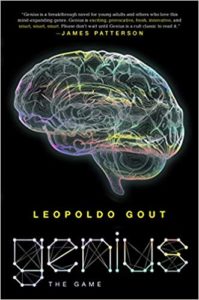 Biswas, the young CEO of a technological start-up, creates the Game as a way to bring 200 of the world’s top young technological geniuses together in what he deems a friendly competition. Among the competitors are longtime friends Painted Wolf, Tunde, and Rex. The three have communicated across distance and time for many years as members of the LODGE. Each has his or her own particular talent: Painted Wolf uses a variety of devices to catch corporate criminals in the act and post their deeds in her activist blog; Tunde is a Nigerian engineer who uses discarded junk to create various useful mechanisms; and Rex is a programmer/hacker who can figure out even the most complex code. All three have a particular life situation that drives them to enter the Game, and each eventually wants to restore the world to justice.
Biswas, the young CEO of a technological start-up, creates the Game as a way to bring 200 of the world’s top young technological geniuses together in what he deems a friendly competition. Among the competitors are longtime friends Painted Wolf, Tunde, and Rex. The three have communicated across distance and time for many years as members of the LODGE. Each has his or her own particular talent: Painted Wolf uses a variety of devices to catch corporate criminals in the act and post their deeds in her activist blog; Tunde is a Nigerian engineer who uses discarded junk to create various useful mechanisms; and Rex is a programmer/hacker who can figure out even the most complex code. All three have a particular life situation that drives them to enter the Game, and each eventually wants to restore the world to justice.
No More Science Kits or Texts in Isolation
Jacqueline Barber and Gina N. Cervetti
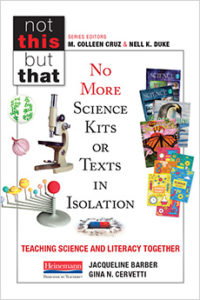 Part of the popular “not this but that” series, this book brings together the expertise of Jacqueline Barber, University of California Associate Director of the Lawrence Hall of Science, and Gina Cervetti, Associate Professor of Curriculum and Instruction at the University of Colorado – Boulder. Following the series format, the authors explain what is currently “not working” in science instruction and then suggest a shift in instructional practices. Their final section of the short text encourages teachers to employ disciplinary literacy practices that call upon students to read, write and talk like scientists.
Part of the popular “not this but that” series, this book brings together the expertise of Jacqueline Barber, University of California Associate Director of the Lawrence Hall of Science, and Gina Cervetti, Associate Professor of Curriculum and Instruction at the University of Colorado – Boulder. Following the series format, the authors explain what is currently “not working” in science instruction and then suggest a shift in instructional practices. Their final section of the short text encourages teachers to employ disciplinary literacy practices that call upon students to read, write and talk like scientists.
Picture-Perfect Science Lessons
Karen Ansberry and Emily Morgan
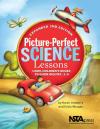 This book is just one selection from Ansberry and Morgan’s popular series that encourages teachers to use picture books as a springboard for science lessons. Each chapter, with titles such as “Close Encounters of the Symbiotic Kind” and “Chemical Change Cafe,” begins with lesson objectives, featured picture books, a pacing guide, and a materials’ list. The lessons themselves incorporate the five Es of scientific inquiry: engage, explore, explain, elaborate, and evaluate. Because picture books are particularly enticing to young readers, Ansberry and Morgan see them as the “perfect” way to help students visualize and make connections to scientific concepts.
This book is just one selection from Ansberry and Morgan’s popular series that encourages teachers to use picture books as a springboard for science lessons. Each chapter, with titles such as “Close Encounters of the Symbiotic Kind” and “Chemical Change Cafe,” begins with lesson objectives, featured picture books, a pacing guide, and a materials’ list. The lessons themselves incorporate the five Es of scientific inquiry: engage, explore, explain, elaborate, and evaluate. Because picture books are particularly enticing to young readers, Ansberry and Morgan see them as the “perfect” way to help students visualize and make connections to scientific concepts.
Multiple Literacies in Project-Based Learning

The Create for STEM Institute at Michigan State University sponsors a variety of ongoing projects aimed at improving STEM education for all levels of learners. One particular project, the Multiple Literacies in Project-Based Learning, is a joint effort between Michigan State University, the University of Michigan, and the University of Wisconsin to “design, develop and test materials that will engage elementary students in learning challenging ideas at the upper elementary level” (“Big Ideas,” n.d.). By integrating science, literacy and mathematics, this project seeks to strengthen students’ interest and engagement in science with the hopes of increasing their desire to pursue science-related careers in the future. Schools in South Redford and the Detroit Public Schools Community District participated in a pilot program last year with positive results for both students and teachers. For more information and consultant support with the NGSS-aligned materials, contact Rich Bacolor, Wayne RESA Science Consultant.
Developing Disciplinary Apprentices: Learning to Read, Write, Think and Talk Like a Scientist

Remember Dr. Nell K. Duke’s video? The one where she encourages elementary-level teachers to consider the long-term detriments students face when instruction in science and social studies is limited or ignored? Hill et al. (2019) concur: “The world is interdisciplinary.” Why then, does classroom instruction tend to separate content areas? In an attempt to improve integration, the MAISA GELN ELTF Essential Instructional Practices in Literacy: Grades 4-5 introduce the concepts of discipline-specific talk, reading and writing within and across disciplines, and exposure to vocabulary through content. By the time students enter middle school, the hope is that they will understand that each discipline has its own unique set of communication practices that require them to develop disciplinary literacy skills. What might that look like in science? The MAISA GELN ELTF Essential Instructional Practices in Disciplinary Literacy: Grades 6-12 encourage science teachers to provide students with engaging science and STEM texts, as well as “compelling reasons” to read them. Furthermore, reading, writing, listening and
speaking within the secondary science classroom should mimic the literacies scientists use on a daily basis to communicate with others in their field. Equally as important, students need to understand that language shifts according to purpose and audience. For example, students will communicate their findings differently depending on the audience’s familiarity with the concept and their level of expertise. Finally, the overarching goal is to immerse students in scientific inquiry as a way to help them search for answers to the questions that are important to them. Teachers can guide students in generating questions, gathering and analyzing data, and using the results to confirm or dispel current thinking on scientific issues or about scientific phenomena. In preparing students for life in the 21st century, it is essential that they understand the increasing importance of argumentation, particularly providing evidence for their claims, and this is directly aligned with the NGSS, who “endors[es] argumentation as a core practice to promote scientific literacy” (Chen, 2019).
Professional Learning
Michigan’s newly appointed State Superintendent, Dr. Michael Rice, makes three encouraging points to educators as they begin a new school year and continue to positively influence the lives of their students.
This short video is a great way to engage parents and community members in the importance of using researched best practices in literacy instruction for the benefit of every child in every classroom every day.
Chief Deputy State Superintendent Sheila Alles provides a brief overview of the Michigan Integrated Continuous Improvement Process (MICIP) designed to focus on the whole child throughout the learning process.
| Upcoming Events at Wayne RESA |
| Online registration for professional learning is available in Wisdomwhere. All course offerings and their descriptions can be found in the ELA PD Course Offerings 2019-20 brochure. |
| Elementary |
| K-2 Real Data to Inform Real Teaching: October 28 and November 11 |
| Wanting to take a closer look at student literacy data and be confident in analyzing and determining next-step teaching points? Join this two-day professional development opportunity to unpack how a variety of observation and assessment tools can empower student learning and help teachers be strategic during individual conferences and small group settings. The intended audience for this course is teachers of grades K-2, reading specialists, and literacy coaches. It is recommended that participants have previously attended the Pathways to K-5 Reading Proficiency series or the Essential Instructional Practices in Early Literacy roll-out through MAISA GELN. (This series will focus on K-3 Essential Instructional Literacy Practices #3 and #9.) For additional information, contact Colleen Whalen. |
| Grades 3-5, Real Data to Inform Real Teaching: November 26 and December 16 |
| Wanting to take a closer look at student literacy data and be confident in analyzing and determining next-step teaching points? Join this two-day professional development opportunity to unpack how a variety of observation and assessment tools can empower student learning and help teachers be strategic during individual conferences and small group settings. The intended audience for this course is teachers of grades 3-5, reading specialists, and literacy coaches. It is recommended that participants have previously attended the Pathways to K-5 Reading Proficiency series or the Essential Instructional Practices in Early Literacy roll-out through MAISA GELN. (This series will focus on K-3 Essential Instructional Literacy Practices #3 and #9.) For additional information, contact Colleen Whalen. |
| I AM a Writer! Strategies to Promote Engagement & Independence in K-2 Writers: December 5, February 13, and April 16 |
| Are you looking for ways to strengthen your students’ engagement, skill, and independence as writers? In this foundational series, participants will explore effective classroom structures and strategies that support engagement in authentic, sustained writing. As they examine key components of the writing process and the architecture of a one-to-one conference, participants will refine their skill in noticing and naming writers’ strengths and challenges to determine next steps for instruction. Modeled and interactive writing strategies and the use of mentor texts will be highlighted as powerful models of what writers do and inspiration to build young children’s identities as writers themselves. Featured in this series will be national literacy consultant, Lisa Cleaveland, coauthor with Katie Wood Ray of About the Authors and A Teacher’s Guide to Getting Started with Beginning Writers, Grades K-2. The intended audience for this course includes K-2 teachers, teachers of striving third grade writers, reading specialists, literacy coaches, and members of the leadership team. It is recommended that participants have previously attended a Pathways to K-5 Reading Proficiency series or the Essential Instructional Practices in Early Literacy roll-out through MAISA-GELN. (This series will focus on K-3 Essential Instructional Literacy Practices #1, #2, #6, and #9.) For additional information, contact Debra Reeves. |
| Leveled Literacy Intervention, K-2: November 20, November 21, and February 26 |
| The Fountas and Pinnell Leveled Literacy Program System (LLI) is a scientifically-based early intervention program designed to prevent literacy difficulties before they turn into long-term challenges. Participants will learn effective small group instructional strategies to provide the intensive support necessary for some primary students to achieve grade level competency in reading and writing. This program also specifically supports the unique needs of English Language Learners. This three-day workshop series will be led by Heinemann Literacy Consultant Dale Severyn, who will share her expertise as a reading specialist and certified Reading Recovery teacher leader. Enrollment in this series is limited to 30 participants, so early registration is recommended. Participants must bring to each session an orange, green, or blue LLI grade level kit (not included in this series). For additional information, contact Debra Reeves. |
| Leveled Literacy Intervention, Grades 3-5: November 18, November 19, and February 25 |
| The Fountas and Pinnell Leveled Literacy Program System (LLI) is a scientifically-based early intervention program designed to prevent literacy difficulties before they turn into long-term challenges. Participants will learn effective small group instructional strategies to provide the intensive support necessary for some intermediate students to achieve grade level competency in reading and writing. This program also specifically supports the unique needs of English Language Learners. This three-day workshop series will be led by Heinemann Literacy Consultant Dale Severyn, who will share her expertise as a reading specialist and certified Reading Recovery teacher leader. Enrollment in this series is limited to 30 participants, so early registration is recommended. Participants must bring to each session a red, gold, or purple LLI grade level kit (not included in this series). For additional information, contact Debra Reeves. |
| Lisa Cleaveland – Writing Right from the Start – Fostering Independence in Beginning Writers: December 5 |
| Join author, national literacy consultant, and master primary teacher, Lisa Cleaveland, to learn best practices in writing instruction. During this foundational workshop, participants will learn the basic tenets of what it means to be a writer, effective classroom structures that support engagement in authentic, sustained writing, and a “gradual release” instructional model that scaffolds primary writers’ growth toward independence. The intended audience for this course is K-2 teachers, reading specialists, literacy coaches, resource room teachers, and members of the leadership team. For additional information, contact Debra Reeves. |
| Overview of the GELN Essential Instructional Practices in Literacy, Grades K-5: January 9 |
| Have you heard the phrase “minimum standard of care”? Are you familiar with how this phrase connects with literacy practices in our K-5 classrooms? If you are curious about these questions and how it can impact your teaching, then this session is for you! Come and learn about the GELN Essential Practices in literacy. In this session, participants will be provided an overview to the K-3 and 4-5 Literacy Essential Practices. Participants will spend time learning about motivation and engagement and the critical role these play in all aspects of literacy development as well as the other 9 essential practices. As each of the 10 essentials is introduced, participants will be given time for reflection and action planning; therefore, school literacy teams and/or grade level teams are encouraged to enroll together. This session could serve as a springboard to build ideas for professional learning linked to school improvement. All participants will receive their own printed copy of the GELN Literacy Essentials for Grades K-3 & 4-5. For additional information, contact Bridget Regan. |
| Pathways to 3rd Grade Proficiency: Essential Instructional Practices for Early Literacy: November 19, December 5, February 4, February 25, March 11, and April 15 |
| In this series, participants will dive into MAISA GELN ELTF Essential Instructional Practices in Early Literacy: Grades K to 3 as they study ten essential research-based practices to enhance their capacity to guide and support students’ development toward 3rd grade reading proficiency. Participants will explore key components of a balanced literacy program, including strategies for developing engagement, stamina, and independence; creating a thriving writing community to support skill and agency in both reading and writing; building necessary foundational skills for automatic in-print processing; using assessment data to plan targeted small group instruction; using interactive read aloud to build background knowledge and expand vocabulary; and developing specific strategies for deep comprehension of increasingly complex text. National early literacy consultants featured in this series will include Lisa Cleaveland and Jan Richardson, who will share research-based instructional strategies for accelerating K-3 students’ growth in literacy toward career and college readiness. Participants will also receive mentor texts and other resources to support literacy instruction. The audience for this 6-day series includes K-3 classroom teachers, reading specialists, literacy coaches, and members of the leadership team. For additional information, contact Debra Reeves. |
| Secondary |
| PSAT/SAT Instructional Shifts: October 21 OR February 5 |
| This course is designed to provide participants with key information and instructional shifts for the PSAT 8/9. The PSAT replaces the M-STEP English Language Arts (ELA) and Mathematics assessments. Participants will understand the PSAT 8/9 test structure, review sample items, and identify the instructional shifts necessary to best support students on this assessment. For additional information, contact Rosalyn Shahid. |
| Coaching |
| Building Coaching Strategies – Entering into the Conversation: November 6, November 7, and December 4 |
| In this learning series, coaches will explore their current beliefs and how those beliefs might facilitate or debilitate the relationship with a teacher. This training will provide coaches with the knowledge, skills, and dispositions to shift teachers’ thinking from responding “This is how we have always done it” to considering new possibilities. Coaches will acquire a vast array of effective coaching skills to mediate the thinking of the teachers they coach. This will enable the teachers to think deeply about their practice, and to monitor and adjust as necessary. Coaches will understand the link between effective coaching and the transformation of teacher practice. The intended audience is instructional coaches and literacy specialists, though it is appropriate for anyone in an instructional coaching role. For additional information, contact Michelle Wagner. |
| Wayne County Coaching Foundations: October 21 OR March 2 (each face-to-face date is followed by six online sessions) |
| Designed as a boot-camp for new and prospective coaches, this series examines key components of coaching. Join us as we explore what literacy coaching is and how it can lead to systemic improvement within a school or district. In this foundational course, we delve into the skills necessary to be an effective literacy coach, including nurturing a growth mindset, developing relational trust, active listening, meaningful use of data, and providing effective feedback. Discover how the Essential Coaching Practices for Elementary Literacy connect with the other components of the Essential Practices in Early and Elementary Literacy and learn how to integrate these core elements into successful practice. The intended audience for this course is new or aspiring literacy coaches. For additional information, contact Michelle Wagner. |
| District Leadership |
| Leadership-driven Coaching for Sustained Success: Fall Date TBD (plus five additional online sessions) |
| The building leader is integral to sustaining an effective coaching model. When employed and supported effectively, literacy coaching strengthens classroom instruction by improving teacher expertise, provides sustainability to district professional development systems and promotes student achievement. This series will explore the characteristics of effective building level implementation and sustainability of coaching and the role that leadership plays in that success, including a healthy principal-coach relationship. Registration coming soon! For additional information, contact Mellissa Wilson. |

Resources: Where can I find...
Science Buddies is a comprehensive site for educators, families and students. Among its other features, Science Buddies provides users with ideas for science fair projects, ways to connect with scientists in a variety of fields, and information about careers in science.
Interested in trending scientific news? Live Science exposes students to a wide variety of newsworthy topics, including health, animals, and technology. Students will particularly enjoy the odd issues covered in the Strange Science section.
Wayne RESA Literacy Team
Meet Michelle Wagner

Michelle Wagner is an English Language Arts Consultant for Wayne RESA. She has worked in public education for nearly two decades, with over ten years of classroom experience. With a Master of Science in Middle Level Education and a Master of Science in Reading Curriculum & Instruction, Michelle is an advocate for and facilitator of Instructional Rounds, Literacy Coaching, curriculum development/review, and much more. Her goal is to empower educators to better respond to the needs of their students, in order to ensure high levels of success for all students.
We look forward to hearing from you!
Laura Gabrion
Debbie Reeves
Bridget Regan
Rosalyn Shahid
Mary-Lu Strimbel
Mari Treece
Michelle Wagner
Colleen Whalen
Mellissa Wilson
If this newsletter has been forwarded to you, and you’d like to subscribe to it, please contact Laura Gabrion
![]() 33500 Van Born Road • Wayne, MI 48184 • 734.334.1300 • 734.334.1620 fax • www.resa.net
33500 Van Born Road • Wayne, MI 48184 • 734.334.1300 • 734.334.1620 fax • www.resa.net
Board of Education
James S. Beri • Mary E. Blackmon • Danielle Funderburg • Lynda S. Jackson • James Petrie
Randy A. Liepa, Ph.D., Superintendent
“Use Your Megaphone”: Inspiring Excellence in Literacy Instruction Read More »